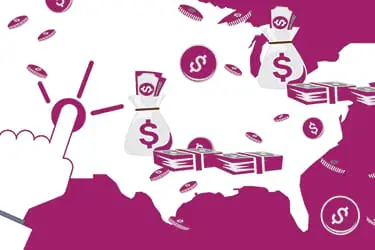With Google Ads opening to online casino from as early as January next year, Roy Coughlan looks at what to expect when running pay-per-click campaigns in the US
The opportunity to use Google Ads to both pull customers who are looking to play online through the search network and AdMob, as well as promote branded activity through the display and YouTube networks, will allow operators to build on what they have learned from promoting sports over the last six months. However, promoting casino is different to sports, and there are certain factors in user behaviour and the Google platforms that should be taken into consideration when planning for launch. These are as follows:
SEARCH INTENT
With the online gambling vertical in its infancy in the US, the intent of a user searching casino-related terms is not always going to be to play online. Casino culture is that of entertainment often outside of the act of gambling, with shows, restaurants, magicians, bands and DJs, and a plethora of branded and generic search terms will display clear signs of land-based intent. Only a portion of these will be with the intent to open a casino account online, if the searcher even knows this is possible.SEARCH VOLUME
Following on from the above, it is important to assess the search volume per regulated state. Estimated reach in the three regulated online casino states accounts for 38 million of the current 64 million for all forms of gambling, indicating the mass of potential casino players (see Fig 2).
Forecasting for potential reach is a combination of the reach available and the intent, and operators and aggregators will need to budget according to the latter.
PRICE
Most operators will be aware of the price of traffic in other markets, so it won’t be a surprise to learn that casino traffic comes at a much higher cost. According to WordStream, casino terms are rated third in their list of the 25 most expensive terms, with operators paying on average $55 for the word ‘casino’ (see Fig 3).
With prices like that, the conversion rate is of the utmost importance and the many factors that go into influencing this will need to be addressed and prepared at the very least in conjunction with budget discussions. Far too often advertisers will enter the auctions under-prepared, and with prices this high and intent as ambiguous in this new-found territory, failing to optimise accordingly is simply an exercise in wasting money.
COMPETITION
Certain operators with sports and casino products have a head start, yet there will be a long line of new players looking to enter the auction, boasting freshly acquired gambling licences looking to take up market share. The auctions are already crowded with affiliates and operators alike, and it will be interesting to see how the pure online players will fare against the already established land-based giants.
When the floodgates open, the following tips will be key in helping drive strong volume while maintaining efficiency:• Quality scoreFar too often a user searching a product-specific casino keyword such as “online roulette” is served a generic casino advert that takes the user to the brand’s homepage, along with a list of casino slots titles. So customise the journey! Factor in the ad and the landing page, and help increase the Quality Score. By doing this you will maintain prices and ensure you are paying the minimum to gain impression share. Enter the market with a strong landing page and continually test the performance, factoring in metadata, user experience and page speed. This will ensure you pay lower market prices for traffic.• Negative listsIf traffic is expensive, and bidding on exact match head terms will eat up budgets, a broad and phrase is your best bet in driving volume and expanding on searches. The key to controlling this is a well-structured list of negative terms before launch to help avoid unnecessary costs. Categories such as “shows and events”, “jobs and vacancies” and “casinos near me” could be examples of queries for which you do not want to show up. This is also key when controlling search activity around branded queries.• Pay-day cyclesDominating terms during pay-day cycles is a tried and tested method in driving volume and increasing conversion ratio. This is the same for the states, yet with each one comes nuances in the cycles. Keep an eye on these for the first few weeks and factor this into budget pacing.• Audience dataWhile not a game-changer by any means in the igaming vertical, use of in-market segments and demographic data can give your campaigns some additional signals for targeting. A key feature is household
“If traffic is expensive, and bidding on exact match head terms will eat up budgets, a broad and phrase is your best bet in driving volume and expanding on searches” income targeting, available in the US. This can be used to weight bids against various segments. With gender targeting, this opens up further control of budget.
With the market set to open as other states liberalise their policies, the faster experience and insights are gathered the easier it will be to build player books. The next step will be keeping them active while monitoring their behaviour. Major efforts will need to be in place to establish responsibility in managing the players that are brought in.
With Google opening its platforms to the industry, the future for casino advertising looks bright. Advertisers that choose to rush towards the digital Klondike should remember that, while some of the above principles remain the same in other territories, the US is only just beginning its journey. There could be many new lessons to be learned.

